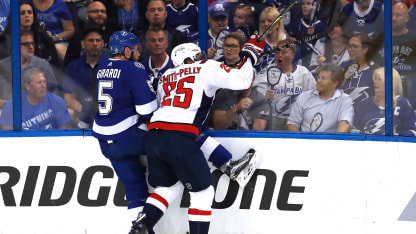First, let's look at the Caps. They played with passion and intensity. They won puck battles. They came out of their own zone cleanly. They efficiently navigated through the neutral zone. They limited turnovers with excellent puck management. They forechecked the Lightning tenaciously and enjoyed extended offensive zone shifts. They generated a high volume of scoring chances. Their power play was dangerous. The four forwards lines and six defensemen were in synch. And, as has been their trademark throughout this playoff season, they defended extremely well in their own end in front of goalie Braden Holtby.
Sound familiar? Those elements were a big part of the Lightning's game against both New Jersey and Boston. Heading into the Eastern Conference Final, the Lightning had set a very high bar, particularly with their five-on-five play. But in this contest, they weren't even close to that earlier level. Or Washington's.
The Lightning didn't manage the puck well, so they weren't able to exit their own end consistently. Consequently, they often were stuck in the defensive zone and unable to go on the attack. Their execution (passing) was off, so they couldn't generate speed through the neutral zone. For much of the night, they weren't able to forecheck the Caps defenders before the puck was moved out of the Washington end. And when they did have possession in the Caps zone, they had problems getting pucks to the net. In the first period, the Lightning posted a franchise playoff low two shots on net. But they had 18 attempts, meaning Holtby didn't have to stop 16 of those shot attempts. Finally, as Jon Cooper and players conceded afterwards, they weren't able to match Washington's intensity level, which led to the aforementioned outcomes in puck battles.
Of course, no team plays a game in a vacuum. The Caps had a hand in some of the Lightning's struggles. But also, the Lightning's wobbly outing greatly aided Washington's play. Ultimately, when you combine a top-notch performance from one team with a clunker for the other, you usually get a lopsided type of game. That's what happened in Game One.
Moving forward in the series, the Lightning know they're going to have to play much better. What's more, they cannot expect any dip in Washington's game.
Lightning Radio Big Moment of the Game (as selected by Phil Esposito):
Alex Ovechkin's power play goal in the final seconds of the first period.
Lightning Radio Three Stars of the Game (as selected by Phil Esposito):

